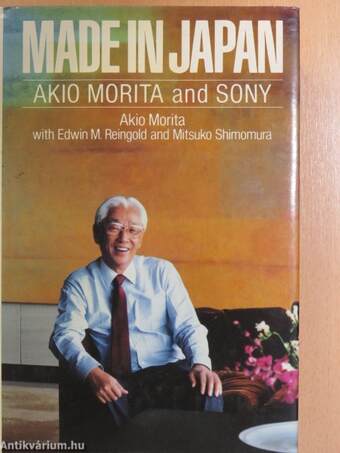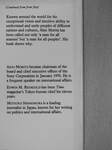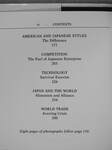1.067.726
kiadvánnyal nyújtjuk Magyarország legnagyobb antikvár könyv-kínálatát

VISSZA
A TETEJÉRE
JAVASLATOKÉszre-
vételek
Made in Japan
Akio Morita and Sony
| Kiadó: | William Collins Sons & Co. Ltd. |
|---|---|
| Kiadás helye: | London |
| Kiadás éve: | |
| Kötés típusa: | Fűzött keménykötés |
| Oldalszám: | 309 oldal |
| Sorozatcím: | |
| Kötetszám: | |
| Nyelv: | Angol |
| Méret: | 24 cm x 16 cm |
| ISBN: | 0-00-217760-9 |
| Megjegyzés: | Fekete-fehér fotókkal illusztrálva. |
naponta értesítjük a beérkező friss
kiadványokról
naponta értesítjük a beérkező friss
kiadványokról
Fülszöveg
Forty years ago, a small group gathered in a burned-out department store building in war-devastated downtown Tokyo. Their purpose was to found a new company, and their optimistic goal was to develop the technologies that would help rebuild Japan's economy. In this early gathering was a young engineer, Akio Morita, then twenty-five years old.
Today, that company is one of the most powerful and respected multinational corporations in the world—Sony—and Akio Morita is its outspoken chairman. From primitive, early tape recorders to the revolutionary compact disc players of today, the Sony story is one of consistently high-quality merchandise and phenomenally successful marketing strategies masterminded by Morita—who realized he would have to create the markets for Sony's unprecedented products. Morita's striking departure from the traditional Japanese business practice of making decisions by committee led to the spectacular success of the Sony Walkman—which was his own idea. And... Tovább
Fülszöveg
Forty years ago, a small group gathered in a burned-out department store building in war-devastated downtown Tokyo. Their purpose was to found a new company, and their optimistic goal was to develop the technologies that would help rebuild Japan's economy. In this early gathering was a young engineer, Akio Morita, then twenty-five years old.
Today, that company is one of the most powerful and respected multinational corporations in the world—Sony—and Akio Morita is its outspoken chairman. From primitive, early tape recorders to the revolutionary compact disc players of today, the Sony story is one of consistently high-quality merchandise and phenomenally successful marketing strategies masterminded by Morita—who realized he would have to create the markets for Sony's unprecedented products. Morita's striking departure from the traditional Japanese business practice of making decisions by committee led to the spectacular success of the Sony Walkman—which was his own idea. And perceiving that Sony's future would be intimately tied to that of the United States, Morita decided to found a U.S. subsidiary, Sony America, and took the highly unusual step of moving his entire family to New York City during its establishment.
From his global perspective, Morita candidly discusses the differences between Japanese and Western management practices, the often stormy trade relations between Japan and the West, the real reasons behind the 'hollowing out of American industry', and the role of technology in preserving the future of mankind.
(Continued from front flap)
Known around the world for his exceptional vision and intuitive ability to understand and unite peoples of different nations and cultures, Akio Morita has been called not only 'a man for ali seasons' but 'a man for ali peoples'. His book shows why.
Akio Morita became chairman of the board and chief executive officer of the Sony Corporation in January 1976. He is a frequent speaker on international affairs.
Edwin M. Reingold has been Time magazine's Tokyo bureau chief for eleven years.
Mitsuko Shimomura is a leading journalist in Japan, known for her writing on politics and international affairs. Vissza
Témakörök
- Közgazdaságtan > Menedzserképzés, marketing
- Közgazdaságtan > Közgazdasági elméletek > Tőkés országok gazdasága
- Közgazdaságtan > Vállalkozások > Vállalatok
- Idegennyelv > Idegennyelvű könyvek > Angol > Műszaki
- Idegennyelv > Idegennyelvű könyvek > Angol > Szépirodalom > Regény, novella, elbeszélés
- Idegennyelv > Idegennyelvű könyvek > Angol > Közgazdaságtan > Menedzserképzés, marketing
- Idegennyelv > Idegennyelvű könyvek > Angol > Közgazdaságtan > Közgazdasági elméletek > Tőkés országok gazdasága
- Idegennyelv > Idegennyelvű könyvek > Angol > Közgazdaságtan > Vállalkozások > Vállalatok
- Műszaki > Elektronika > Egyéb
- Műszaki > Ipar > Ipartörténet
- Szépirodalom > Regény, novella, elbeszélés > Az író származása szerint > Ázsia > Japán
- Szépirodalom > Regény, novella, elbeszélés > Tartalom szerint > Karriertörténetek
- Idegennyelv > Idegennyelvű könyvek > Angol > Közgazdaságtan > Gazdaságtörténet
- Közgazdaságtan > Gazdaságtörténet
- Műszaki > Idegennyelv > Angol
- Műszaki
- Szépirodalom > Regény, novella, elbeszélés > Tartalom szerint > Életrajzi regények > Önéletrajzok, naplók, memoárok
Megvásárolható példányok
Nincs megvásárolható példány
A könyv összes megrendelhető példánya elfogyott. Ha kívánja, előjegyezheti a könyvet, és amint a könyv egy újabb példánya elérhető lesz, értesítjük.











